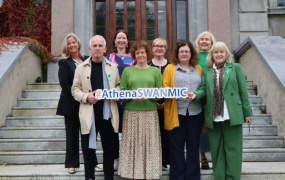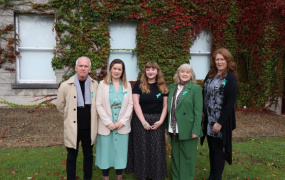Governance & Strategy
MIC Trustees & Governing Authority
MIC Trustees & Governing Authority (An tÚdarás Rialaithe)
2024 brought an end to the 2018-2024 term of the MIC Governing Authority which had overseen a remarkable period of growth and development at the College, including consolidation of the integration of the Thurles Campus, implementation of the 2018-2024 Strategic Plan, A Flourishing Learning Community, appointment of Professor Eugene Wall as College President, the complex process of ensuring that the library construction project remained a viable strategic project, navigation of the circumstances arising from the COVID-19 pandemic, and a major dialogue with the University of Limerick aimed at a closer structural alignment.
The MIC Trustees, whose reserved powers include appointment of the College President and the fundamental strategic direction of the College as an entity with a Main Object, were equally faced with addressing significant events during this period, successfully steering the institution through challenges and meeting the call of opportunity, in collaboration with the Governing Authority. The members of each body are listed in Appendix A of this report, with some serving on one or both for 10 years. The College is indebted to them for their service and their wisdom in an era where the requirements of governance have become more demanding than ever before.
Appointment of President
Appointment of Professor Dermot Nestor as 11th College President
In August 2024, following a rigorous recruitment and selection process overseen by the College Trustees, MIC announced the appointment of Professor Dermot Nestor — an acclaimed biblical scholar originally from Limerick City — as its 11th President. At the time, Professor Nestor was serving in Sydney as Professor of Hebrew Bible at Australian Catholic University, where he had held pivotal roles including National Head of School (Theology) and Executive Dean of Theology and Philosophy. His academic credentials include a BA and PhD from Trinity College Dublin, focusing on ancient Israelite identity, and a strong record of scholarly publications and PhD supervision. The appointment, slated to commence in early November 2024, marked a transition following the retirement of Professor Eugene Wall.
Upon accepting the role, Professor Nestor expressed profound humility and deep gratitude, particularly acknowledging the MIC Trustees and his predecessors for the legacy they had extended to him. He emphasized his ambition for institutional growth, committing to build upon MIC’s Catholic heritage and its teacher education and liberal arts mission rooted in Catherine McAuley’s founding vision. His international experience, especially in interdisciplinary, collaborative, and internationally engaged initiatives, positions him to lead MIC through its 125th anniversary and beyond.
MIC-UL Strategic Dialogue Process
A high-level dialogue group consisting of the two Presidents, along with senior executive colleagues, met over the course of the year to explore the possibility of forging a closer structural relationship between the two institutions. The discussions were externally chaired by Prof. Tom Collins.
The group met on 16 occasions, which included two briefing meetings with Dr Alan Wall, CEO of the HEA as well as meetings with the Minister for Further and Higher Education, Research, Innovation, and Science. The discussions culminated in the development of a shared set of proposals and a related model. Although it was not agreed by DFHERIS that the model could be put into effect at this time, the process brought about a greatly enhanced spirit of partnership between UL and MIC, which continues to catalyse a range of innovative collaborations.
Institutional Self-Evaluation and Quality Review
The College underwent its second institution-level quality review in 2024, with the last review completed in 2017. Preparations for the 2024 review cycle led to the submission of a comprehensive Institutional Self-Evaluation Report (ISER) to the University of Limerick, our accrediting partner, in December 2023.
External Review Panel
An external review panel was appointed by the University of Limerick, with academic peers drawn from the higher education sector in Ireland, the UK, and Sweden, as well as a representative of the Irish student community and a professional colleague representing the broader community engagement mission of HEIs.
The external review panel members were:
- Professor Emeritus John L. Davies (Chair)
- Professor Stella Jones-Devitt, Professor of Critical Pedagogy, University of Staffordshire
- Professor Lena Adamson, Associate Professor of Psychology, University of Stockholm
- Dr Paul O'Leary, Head of Quality Promotion and Academic Programme Development, SETU
- Ms Michelle Moore, Parent-Child+ Senior Programmes Specialist, National College of Ireland
- Ms Sarah Porcenaluk, Doctoral Candidate, University of Galway
Institutional Quality Review: A Resounding Endorsement of Excellence
The Review Panel delivered a resounding endorsement of the quality culture and practices at MIC. In their report, the Panel members found "a pervasive and well-functioning QA/QE culture, actively supported by a caring and committed staff" (Review Panel Report, 2024, p. 49). This finding speaks to the collective dedication of the entire College community to maintaining the highest standards in all aspects of its work.
Particularly noteworthy was the Panel's recognition of our student-centred approach. They observed "a very caring and supportive culture for students at MIC, which is a practical expression of the College's ethos, with an undoubted staff commitment at all levels in helping achieve the best possible student outcomes" (Review Panel Report, 2024, p. 18). This validation confirms that our Catholic ethos and social justice mission continue to permeate every aspect of the student experience.
The Review Panel also highlighted our innovative approach to data-informed decision-making, noting that "MIC's investment in the e-OLAS system positions the College as potential thoughtleaders in the Irish HE sector by utilising data-driven decision-making to continually improve the quality of the student experience" (Review Panel Report, 2024, p. 49). This recognition positions MIC at the forefront of quality enhancement practices nationally.
Our research endeavours received particular commendation, with the Panel acknowledging "a coherent effort to address MIC's aspirations for university-level status through the advancement of research" and praising our "comprehensive, impressive and effective" CPD programme supporting staff research advancement (Review Panel Report, 2024, p. 55). The Panel's endorsement extended to our external engagement activities, specifically highlighting our partnership with Boston College's Lynch School of Education on the City Connects programme as "commendable specifically due to its evidence-based initiative [that] empowers teachers and schools to support students and families facing socioeconomic challenges" (Review Panel Report, 2024, p. 55).
Student satisfaction emerged as a consistent theme throughout the review. As the Panel noted, "Students from all groups at the site visit expressed very high satisfaction with MIC. All students thought their learning experience to date corresponded with their expectations if not more." (Review Panel Report, 2024, p. 54).
This institutional review provides independent verification that Mary Immaculate College continues to deliver on its mission while maintaining robust quality assurance processes. The Panel's recommendations provide a roadmap for continued enhancement, ensuring that we build upon our strengths while addressing areas for development. As we look to the future, this external validation reinforces our position as a leading institution in Irish higher education, committed to excellence in teaching, research, and service to our community.
Key Quality Enhancement Milestones and Initiatives & Quality Review Process
Reform of Academic Programme Approval Procedures
MIC completed a significant revision of its Academic Programme Development Standard Operating Procedure, designed to ensure educational and academic decisions remain independent of commercial influence. A new Business Programme Appraisal Committee (BPAC) was established to review financial and strategic viability in parallel with academic merit of programme development and modification proposals. The revised three-stage process strengthened governance, safeguarded academic integrity, and clarified roles in programme development.
Implementation of a New Programme Approval Workflow
The three-stage approval framework now encompasses:
- Initial Concept Approval by the Academic Planning and Approvals Committee (APAC)
- Financial and operational appraisal by BPAC
- Final academic scrutiny by Academic Programmes Approval Committee (APAC)
This workflow supported enhanced transparency, separation of academic and financial considerations, and better stakeholder engagement.
Engagement in QQI Degree Classification Analysis
MIC actively participated in QQI's Degree Classification Project (2012-2022), contributing two detailed case studies:
- Bachelor of Education (B Ed)
- Bachelor of Arts (BA)
These case studies addressed changes in curriculum structure, teaching strategies, assessment models, and duration, providing a robust analysis of factors that may have contributed to shifts in degree classification profiles. MIC also submitted formal responses to QQI's queries to assist in the national meta-analysis.
Quality Review Process 2023-2024
Departmental Quality Review
- Department of Theology and Religious Studies (completed)
- Department of Psychology (planning initiated; review scheduled for 2024-2025)
Professional Services Quality Review
- Library Services (completed; recommendations under implementation)
- ICT Services (underway; includes benchmarking against sectoral best practice)
Academic and Support Unit Self-Evaluations
Revised self-evaluation templates piloted in selected units to increase alignment with strategic objectives and enhance evidence-based reporting
Module Evaluation and Feedback Enhancements
- Refinement of student feedback mechanisms including the integration of e-OLAS analytics for real-time module-level review and improved closing-the-loop practices
Annual Quality Reporting (AQR)
- Strengthened integration of institutional data sets into the annual quality cycle to support continuous improvement, strategic planning, and external compliance
System Performance Framework
The HEA launched its new System Performance Framework at the end of September 2023 and followed this by requesting submission of the first draft of a new 'Performance Agreement 2024-2028. This followed completion of the second cycle of the HEA strategic dialogue and implementation of the previous agreement (termed the Performance Compact). It is noteworthy that the external peer review panel asked to evaluate the College’s engagement with the second cycle offered high commendation for its implementation of its performance compact, describing the institution’s approach as both strategic and future-oriented. Particularly praiseworthy was MIC’s performance under Key Strategic Objectives 5 and 6, which focused on continuous quality improvement and operational excellence. The panel remarked that “the MIC response to this objective is exemplary", citing the College’s capacity to develop dynamic, integrated systems such as QUILLE and e-OLAS. These innovations were acknowledged as instrumental in ensuring institutional agility, enabling MIC “to act quickly in evaluating successes, in having the agility to change strategic and operational outcomes if necessary, and in developing an evidence-based understanding of what… works and what doesn’t”. This level of responsiveness and foresight was seen as indicative of a high-functioning academic institution that is deeply attuned to sectoral challenges and opportunities.
In moving to the new framework, College management met with the HEA on 24 January 2023 as part of the schedule of activities aimed at submission and adoption of the 2024-2028 System Performance Agreement. Per schedule, a preliminary draft was submitted to the HEA by the College in November 2023, and the meeting of 24 January was convened as an opportunity for feedback from the HEA on the contents of the draft. An iterative drafting process, punctuated by several engagements with the HEA towards refinement of the contents of the draft, continued until May 2024, at which time the College formally submitted the Agreement for adoption. This document was placed before the Executive Team and the Governing Authority before its submission. Engagement with the HEA in respect of the first draft was constructive and supportive of the objectives set out by the College.
Academic Promotions
Following approval of a revised promotions policy by members of An tÚdarás Rialaithe at the end of 2023, a call for a new round of promotions was issued on 20 December 2023. These promotions rounds made up to three (3) Senior Lecturer appointments in the Faculty of Education and up to three (3) Senior Lecturer appointments in the Faculty of Arts.
The successful applicants were:
Faculty of Education
- Dr Anne Dolan, Department of Learning, Society and Religious Education
- Dr Mary Moloney, Department of Reflective Pedagogy and Early Childhood Studies
- Dr Gwen Moore, Department of Arts Education and Physical Education
Faculty of Arts
- Dr Sabine Egger, Department of German Studies
- Dr John Morrissey, Department of Geography
- Dr Róisín Ní Ghairbhí, Roinn na Gaeilge
The overall quality of the applications received was commended by the Promotions Board and reflected the very high standards at which academic colleagues were performing.
The College strongly endorsed the importance of establishing and maintaining an academic culture where professional excellence is recognised and rewarded through career advancement and remains committed to continuing promotional rounds.
Official Languages Act Compliance
Compliance Summary for Academic Year 2023/2024
MIC complied with the Official Languages Act during the 2023/2024 academic year. The Official Languages (Amendment) Act 2021 significantly strengthened the provisions of the Official Languages Act 2003. In particular, Section 4B of the 2021 Amendment introduced new obligations for public bodies to actively promote and use the Irish language for official purposes. One such obligation was the inclusion of a report on compliance within the institution's annual report.
2024 Highlights
The MIC official appointed under Section 4B of the Official Languages Act (as amended) was contacted by the Irish Language Services Advisory Committee. This committee was established under Section 18(C) of the Acts by the Minister for Tourism, Culture, Arts, Gaeltacht, Sport and Media. MIC was selected to participate in research led by the University of Galway. As part of this initiative, 187 staff members completed an anonymous survey that would inform the first National Plan for Irish Language Public Services.
The Irish Language Review Group completed a new Irish Language Policy, which was approved by the College Executive Team. The policy was circulated for consultation in line with the college's policy development protocol and was approved by An tÚdarás Rialaithe and is published on the College website.
In accordance with Section 10A of the Official Languages (Amendment) Act 2021, MIC submitted its compliance report to An Coimisinéir Teanga on 28 March. This section mandated that:
- At least 20% of all advertising placed by a public body annually must be in the Irish language
- A minimum of 5% of the annual advertising budget must be allocated to Irish language media
These initiatives reflected MIC's ongoing commitment to fostering a bilingual environment and fulfilling its statutory obligations under the Official Languages Act. Challenges remain in establishing the College as a leading exemplar of excellence in giving tangible expression to the vibrancy of the Irish language on its campuses. A new strategic plan for the language, based on the newly approved Irish language policy, as well as the appointment of a new coordinator of Irish language services, will contribute to the accomplishment of these crucial objectives.
- MIC Trustees & Governing Authority
- Appointment of President
- MIC-UL Strategic Dialogue Process
- Institutional Self-Evaluation and Quality Review
- Key Quality Enhancement Milestones and Initiatives & Quality Review Process
- System Performance Framework
- Academic Promotions
- Official Languages Act Compliance







